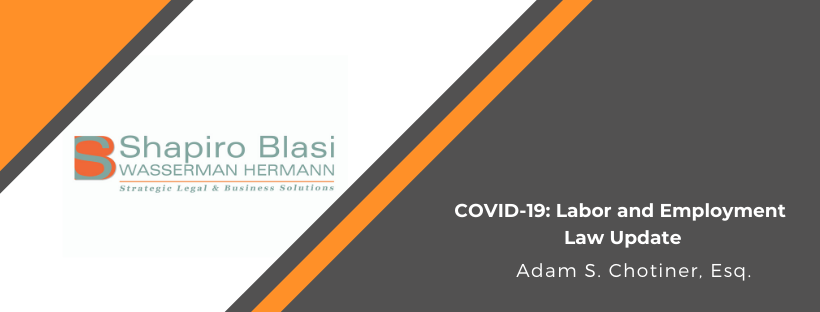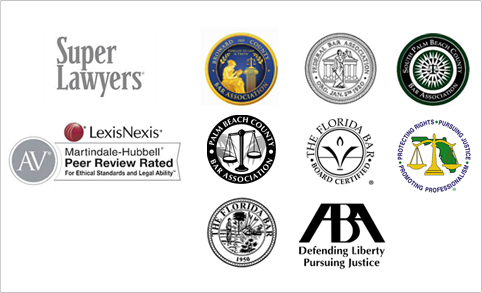




The Families First Coronavirus Response Act (FFCRA) went into effect on Wednesday, April 1, 2020. In general, the FFCRA requires all employers with fewer than 500 employees to provide emergency paid sick leave and emergency Family and Medical Leave Act leave for specific COVID-19-related reasons.
All covered employers – especially small businesses with fewer than 50 employees – must individually analyze how the law impacts its employees and operations. As further explained below, the “small business” exemption has limited applicability, so it’s very important that every employer with fewer than 500 employees be aware of the FFCRA’s requirements and obligations.
The FFCRA contains two separate paid leave mandates:
First, the Emergency Paid Sick Leave (E-PSL) Act provides 80 hours (to full-time employees) or “two weeks” (to part-time employees) of paid leave at the greater of the employee’s regular rate or the applicable minimum wage, to a maximum of $511 per day and a total of $5,110, if the employee is unable to work or telework (work remotely) for the following reasons:
Notably, under regulations issued by the U.S. Department of Labor (DOL), the first reason above includes “containment, shelter-in-place, or stay-at-home orders issued by any Federal, State, or local government authority.” This broad regulatory definition is expected to encompass many more employees than originally anticipated when the FFCRA was passed.
E-PSL may be paid at 2/3 the greater of the employee’s regular rate or the applicable minimum wage, to a maximum of $200 per day and a total of $2,000, to an employee who is unable to work or telework for any of the following reasons:
Second, the Emergency Family and Medical Leave Act (E-FMLA) allows employees to use their 12 weeks of FMLA leave (and grants such leave to certain previously ineligible employees) if they are unable to work or telework because they have a bona fide need to care for a child because of the COVID-19-related closure of the child’s school or child care facility, or the unavailability of a child care provider. After the first ten days (or two weeks) of unpaid FMLA leave (which may be covered by E-PSL or other paid leave, at the employee’s choice), the remainder of E-FMLA leave is paid at 2/3 of the employee’s regular rate, up to a maximum of $200 per day, and $10,000 in total.
The small business exemption has limited applicability. Small businesses are exempt from mandated paid leave requirements only if:
Thus, the small business exemption is only applicable, if at all, for employees wanting to take leave because a child’s school or place of care is closed or the child care provider is unavailable due to COVID-19. There is no small business exemption for paid leave for any of the other specified reasons.
The DOL regulations suggest the small business exemption is not a blanket exclusion from all paid leave obligations. Instead, it only exempts small employers from the obligation to pay those otherwise eligible employees whose absence would cause the small employer’s expenses and financial obligations to exceed available business revenue, pose a substantial risk, or prevent the small employer from operating at minimum capacity. In other words, the exemption should be analyzed on a case-by-case basis.
In order to elect this small business exemption, the employer must document that a determination has been made pursuant to the specified criteria. This documentation is not sent to the DOL, but simply retained in the employer’s files. This implies that if an employee brings a claim for violation of the FFCRA based on the employer having claimed the exemption, the employer would need to defend the claim by establishing entitlement to the exemption. The documentation would also be available for inspection if the DOL launches an investigation. Simply put, the exemption is not conclusively “prospective.”
In order to take paid sick leave and/or expanded family and medical leave intermittently, the regulations emphasize that the employee and employer must have “a clear and mutual understanding” that such leave can be taken in such manner and must also have an agreement on the increments of time in which the intermittent leave may be taken. Absent such an agreement, which need not be in writing, no leave under the FFCRA may be taken intermittently.
In the case of an employer that directs or allows an employee to telework, the employee may take paid sick leave or expanded family and/or medical leave intermittently, in any agreed increment of time, while the employee is teleworking, regardless of the reason for the leave.
However, if the employee is working onsite, intermittent leave is only available if the reason for leave is a school closure or unavailability of a child care provider. This is because all the other qualifying reasons for leave carry an inherent risk that “the employee is, may be, or is reasonably likely to become, sick with COVID-19, or is exposed to someone who is, may be, or is reasonably likely to become, sick with COVID-19,” and thus permitting such an employee to work onsite intermittently would run against the public policy of containing the virus.
All covered employers must post the official notice poster issued by the DOL (click here) – or a notice containing the same information – “in conspicuous places.” The notice can be mailed or emailed to employees who are teleworking, and it can be posted on the employer’s website or intranet. This notice requirement applies to all businesses with fewer than 500 employees, even if an exemption might apply.
The DOL regulations explain that for paid sick leave or expanded family and medical leave, an employer may require its employees to adhere to reasonable notice procedures as soon as practicable after the first workday or portion of a workday for which an employee receives paid sick leave. If an employee fails to give proper notice, the employer must still give the employee notice of the failure and an opportunity to provide the required documentation prior to denying the request for leave.
The regulations further provide that, in connection with taking leave, an employee must provide a signed statement to their employer containing: (1) the employee’s name; (2) the date(s) for which leave is requested; (3) the COVID-19 qualifying reason for leave; and (4) a statement representing that the employee is unable to work or telework because of the COVID-19 qualifying reason.
In addition, an employee must provide the name of the government entity that issued the quarantine or isolation order to which the employee is subject, if that is the reason for paid sick leave. An employee seeking leave because he or she is self-quarantined must provide the name of the health care provider making the recommendation to quarantine. An employee caring for an individual who is quarantined must provide either (1) the government entity that issued the quarantine or isolation order to which the individual is subject or (2) the name of the health care provider who advised the individual to self-quarantine, depending on the precise reason for the request.
For employees requesting expanded family and medical leave, they must provide:(1) the name of the child being cared for; (2) the name of the school, place of care, or child care provider that closed or became unavailable due to COVID-19 reasons; and (3) a statement representing that no other suitable person (including a co-parent, co-guardian, or the usual child care provider) is available to care for the child during the period of requested leave. If care is needed during daylight hours for a child older than 14, then the employee must also include a statement that special circumstances exist requiring the employee to provide care.
Employers of “health care providers” can decide to not allow their employees to take paid leave under the FFCRA. Congress’s goal in giving such employers this ability was to keep health care providers on the job when they are needed most, rather than allowing employees to take paid leave to stay home with their children or for other reasons covered by the FFCRA.
Under the regulations, for purposes of the exemption “health care provider” includes anyone employed at a doctor’s office, hospital, health care center, clinic, post-secondary educational institution offering health care instruction, medical school, local health department or agency, nursing facility, home health care provider, any facility that performs laboratory or medical testing, pharmacy, or any similar institution, employer or entity.
“Health care provider” also includes any individual employed by an entity that contracts with any of the above institutions, employers, or entities to provide services or to maintain the operation of the facility, as well as those who provide medical services and produce medical products and equipment. As a result, employees of third-party contractors that provide food services, maintenance services, or other services or goods to hospitals, nursing homes, and other employers are now also included in the definition of a “health care provider” under the paid leave provisions of the FFCRA.
The paid leave mandates are fully funded up to the caps set forth above through a tax credit. In its COVID-19-Related Tax Credits for Required Paid Leave Provided by Small and Midsize Businesses FAQs, the IRS explains that the credit for the full amount of qualified paid leave wages, plus allocable qualified health plan expenses and the employer’s share of Medicare tax, is allowed against the employment taxes on all wages and compensation paid to all employees. If the amount of the credit exceeds the employer portion of these federal employment taxes, the excess is treated as an overpayment and refunded to the employer.
Employers are required to retain all documentation related to requests for leave for a period of four years. If employees make an oral request for leave, the employer should document and retain such information for four years. If an employer denies an employee’s request for leave pursuant to the small business exemption, the employer must document its authorized officer’s determination that the prerequisite criteria for that exemption are satisfied and retain such documentation for four years.
This is merely a summary of key provisions of the FFCRA. There are other provisions, and many provisions of the FFCRA contain nuances and may be open to interpretation depending on the specific facts and circumstances. This summary does not constitute legal advice, and employers should obtain the advice of an attorney to address questions or concerns about the applicability of the FFCRA to their business.

Boca Raton
7777 Glades Road
Suite 400
Boca Raton, Florida 33434
Phone (561) 477-7800
Fax (561) 477-7722
Contact Us
Client Portal
Terms and Conditions
Privacy Policy
Web Accessibility
Contacting Shapiro, Blasi, Wasserman & Hermann, P.A. or any individual Shapiro, Blasi, Wasserman & Hermann, P.A. attorney or employee via the internet does not create an attorney-client relationship without our prior written agreement.
Please do not send us any information you regard as confidential unless and until we have agreed to a formal attorney-client relationship.
Information conveyed prior to establishing an attorney-client relationship is not privileged or confidential.
You should also be aware that information you convey to Shapiro, Blasi, Wasserman & Hermann, P.A. via the Internet may not be secure.
Copyright 2025 Shapiro, Blasi, Wasserman & Hermann, P.A. All Rights Reserved
Shapiro, Blasi, Wasserman & Hermann, P.A., with offices located in Boca Raton, Florida, is a full service law firm with practice areas including Commercial Litigation; Labor and Employment; Product Liability; Construction Litigation; Real Estate Transactions and Litigation; Business Transactions and Litigation; Family Law; Wills, Trusts and Estates; Healthcare; ADA Public Access Claims and Compliance; Bankruptcy and Creditor's Rights; Probate, Trust and Fiduciary Litigation; and Appellate Matters. We represent clients throughout Florida and nationwide.
We are a debt relief agency. We help people file for bankruptcy relief under the Bankruptcy Code.
Please review the privacy policy along with the terms and conditions of our site. Web Development by IWD Marketing